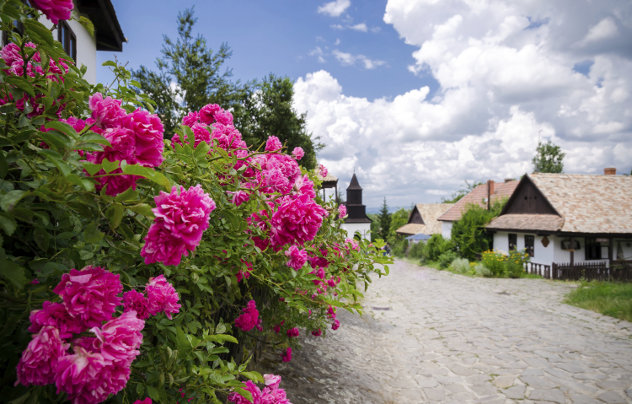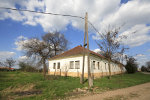Emigrating to Hungary and the consequences
Robert Kemkers, Thursday, 7 July 2016

Author: Robert Kemkers, .
Translated by Jos Deuling,
Hungary is in recent years an increasingly popular emigration destination for people from almost all age groups. During the 13 years of the existence of our office, we have observed a marked increase in customers who consider immigration and search for a house Hungary. As before, there are still buyers who want a holiday house, but there is a definite shift towards people considering a (semi-) permanent residence in the land of the Magyars. The very low prices of real estate (house prices in Hungary are among the lowest in the EU!) are of course one of the reasons. Also, more and more people who own a holiday house in Hungary, decide to move here permanently when they retire. Several families have been able to realize their dream even earlier and could stop working earlier because the cost of living in Hungary are significantly lower, and the tax rates are also much lower.
The rates for the actual use of most utilities are about half the rates in the Benelux, and one barely pays for the fixed charge. Hungary has no capital gains tax and for most people, the total municipal taxes are only a few thousand forints per year. The road tax for most cars is less than € 10 / month and similar amounts for the liability insurance. The income tax is 15% (flat tax), and there’s no tax on pension. In most cases, Dutch and Belgians living permanently in Hungary, who not registered in the country of origin and don’t work there anymore, receive a gross pension and don’t have to pay income tax.
A welcome bonus is the much lower prices for gasoline (currently about € 0.96 for Euro95), eating (€ 3-6 per person for lunch or meal in a restaurant), day trips and a visit to a thermal spa, as well as daily groceries. As well as the fact that you can hire for a very attractive hourly rate services that a 'luxury' in the UK, for example, a gardener, housekeeper, elderly nurse or beautician.
For most Dutch and Belgian immigrants in Hungary, however, other than purely financial reasons are decisive. That’s not surprising because the country has a lot to offer! First of all, there is a lot of space: there are fewer people than in Belgium (tight 10 million), but the country is three times larger. The population is 4-5 times lower compared with only Flanders or the Netherlands, where we also have to consider the fact that about 2.5 million Hungarians are living in the agglomeration Greater Budapest. In rural areas, a lot of space available in addition to the expansive nature: in most villages a garden of 1000 m2 (10 acres) is considered rather small and plots of 2000-5000 m2 (the latter is half a hectare!) are the rule rather than the exception. Space here is almost always associated with tranquility. Because the houses are usually not close to each other one has more freedom and privacy. Traffic congestion (except in downtown Budapest on a Friday afternoon) is in Hungary virtually unknown, and at night it's still really dark: you can see many constellations from your private garden at night.
Hungary is closer than most people think: you can reach it by car in one day. Who wants to take it easy can stay overnight in Germany or Austria. One can fly Daily with cheap airline tickets from various Dutch and Belgian airports to Hungary in just 100 minutes! The infrastructure is also good, with modern, well-maintained highways and comfortable Intercity trains to all provinces.
For many compatriots, the Hungarian climate is attractive: lots of sunshine and early spring, long summer and late summer and old-fashioned winters. There is always a breeze that cools, especially in the Southwest, where Baranya county (and southern parts of neighboring Tolna and Somogy) has a sub-Mediterranean climate.
Apart from the vast forests, beautiful lakes (much more than just Balaton, Velence- and Tisza), rolling vineyards and vast sunflower fields, there a lot of recreational and sports opportunities: from cycling to boating, surfing and sailing to mountain climbing and fishing, hunting or bird watching. Each region has something to do, for all ages. Culture enthusiasts will love the many charming historic town centers, and ultra-modern shopping malls offer today all that one can find in Western Europe (and often for a slightly more affordable price).
For those who have a poorer health Hungary is also suitable as an emigration destination. The country is not for nothing world famous for its hundreds of thermal baths and spas. In virtually every region there are spas, they all have their healing properties for certain disorders. In the area around the city of Pécs, one reaches in an hour drive a dozen thermal baths. Most spas have a modern clinic with many facilities. There are several good, very modern private hospitals and dental practices where one speaks good English and German, and where one receives treatment for a fraction of the cost in the UK, without long waiting lists.
Healthcare in Hungary is excellent. State-funded hospitals and clinics offer all treatments at a high level, in particular, the university hospitals in Hungary (among others in Pécs, Szeged, Debrecen, and Budapest), which attract students from all over the world. The famous physician Semmelweis was a Hungarian, and many have followed in his footsteps. Hospitals do not always appear as modern, but in Hungary, it is believed that it is better to use the money to keep drugs cheaply and shorten the waiting lists than to build new luxury buildings. There are per capita significantly more specialists and general practitioners; even the smallest village has a weekly consultation with a (family) doctor and for a regular GP one need not have to drive far, nor for a health center or hospital.
The benefit for Dutch and Belgian is that Hungary, as an EU country, accepts the European health insurance cards (EHIC). In a case of emergency, one can turn anywhere for help, almost always free. For those who decide to live permanently in Hungary, there is the possibility to insure oneself through the Hungarian National Health Fund (OÉP). For people whit a job in Hungary, the employer deducts the premium from the wages (in total about 7%), who don’t work have to insure themselves for a basic amount of the equivalent of about € 23 / month. One can settle this now relatively quickly through the health insurance fund and the tax in Hungary.
Emigrating to Hungary is, in contrast to what one might think because of the language, not so complicated. Since Hungary belongs to the EU since 2004, this need not be a lengthy and difficult procedure, in fact, there not very much to take care of in Hungary when you emigrate. The main thing is to get hold of a residence permit and address card which can obtain in a single procedure with the Immigration Service (with a branch in each province). There are always people there who speak English and frequently also German, and on certain days also individuals who speak French or any other European language. One needs to fill out a simple form of two pages in English or German. The only requirements for EU citizens are that they possess a valid identity card, European health insurance card (EHIC), own property (or a lease and permission of the owner) and that they can demonstrate that they have sufficient financial means for daily necessities. Financial means start from approx € 350 / month p.p., being approximately the minimum gross monthly wage in Hungary. One can proof this by showing bank statements from the past six months or paychecks, which must contain a signature and stamp of the bank or benefits agency; clearly legible and, if necessary, translated into Hungarian. Much easier, however, is to show one owes an amount of approximately € 1,300 p.p. in cash (or has this sum in a Hungarian bank account). If one pays the adhesive stamps of 1000 forints (about € 3.20) for the charges and everything runs smoothly, one gets the residence permit while waiting. Within 10-15 days one sends the Hungarian address card by registered mail to your new address. It is also possible in Hungary to have a second residential address (in addition to any other Hungarian or foreign address). One can also request this if one has not yet decided to emigrate permanently. Your nationality doesn’t change; it remains just a Belgian, Dutch or any (European) nationality you may even have! After emigration one can always return to the Netherlands or Belgium; as a citizen of that country, one can enroll there again without problems.
With a residence card and address card you can take care of various issues in Hungary, the purchase or import of a car on Hungarian license plate, take out a subscription for mobile phone and so on. Furthermore, one can vote for the local council. So many benefits and no downside I can think of (except for very special cases in the event of tax rules).
Children must attend school from their third year, but education is free, including textbooks and in most cases the lunch during the day. If there is no school in their own place, free transportation is provided for elementary school students (t / m 14 years), older children travel at a low price with the good and widespread public transport (and free travel from 65+!).
Those who have emigrated and would like to establish economic, recreational or other activities have plenty of opportunities in Hungary: the country has a very business-friendly environment with starting grants, investment premiums and an unprecedented low corporate tax of only 10% in the EU! The population is relatively well educated, with many handy craftsmen in traditional craft occupations and more and more Hungarians have gained working experience over the years in German, English and Dutch speaking countries.

Author: Robert Kemkers, .
Translated by Jos Deuling,
Hungary is in recent years an increasingly popular emigration destination for people from almost all age groups. During the 13 years of the existence of our office, we have observed a marked increase in customers who consider immigration and search for a house Hungary. As before, there are still buyers who want a holiday house, but there is a definite shift towards people considering a (semi-) permanent residence in the land of the Magyars. The very low prices of real estate (house prices in Hungary are among the lowest in the EU!) are of course one of the reasons. Also, more and more people who own a holiday house in Hungary, decide to move here permanently when they retire. Several families have been able to realize their dream even earlier and could stop working earlier because the cost of living in Hungary are significantly lower, and the tax rates are also much lower.
The rates for the actual use of most utilities are about half the rates in the Benelux, and one barely pays for the fixed charge. Hungary has no capital gains tax and for most people, the total municipal taxes are only a few thousand forints per year. The road tax for most cars is less than € 10 / month and similar amounts for the liability insurance. The income tax is 15% (flat tax), and there’s no tax on pension. In most cases, Dutch and Belgians living permanently in Hungary, who not registered in the country of origin and don’t work there anymore, receive a gross pension and don’t have to pay income tax.
A welcome bonus is the much lower prices for gasoline (currently about € 0.96 for Euro95), eating (€ 3-6 per person for lunch or meal in a restaurant), day trips and a visit to a thermal spa, as well as daily groceries. As well as the fact that you can hire for a very attractive hourly rate services that a 'luxury' in the UK, for example, a gardener, housekeeper, elderly nurse or beautician.
For most Dutch and Belgian immigrants in Hungary, however, other than purely financial reasons are decisive. That’s not surprising because the country has a lot to offer! First of all, there is a lot of space: there are fewer people than in Belgium (tight 10 million), but the country is three times larger. The population is 4-5 times lower compared with only Flanders or the Netherlands, where we also have to consider the fact that about 2.5 million Hungarians are living in the agglomeration Greater Budapest. In rural areas, a lot of space available in addition to the expansive nature: in most villages a garden of 1000 m2 (10 acres) is considered rather small and plots of 2000-5000 m2 (the latter is half a hectare!) are the rule rather than the exception. Space here is almost always associated with tranquility. Because the houses are usually not close to each other one has more freedom and privacy. Traffic congestion (except in downtown Budapest on a Friday afternoon) is in Hungary virtually unknown, and at night it's still really dark: you can see many constellations from your private garden at night.
Hungary is closer than most people think: you can reach it by car in one day. Who wants to take it easy can stay overnight in Germany or Austria. One can fly Daily with cheap airline tickets from various Dutch and Belgian airports to Hungary in just 100 minutes! The infrastructure is also good, with modern, well-maintained highways and comfortable Intercity trains to all provinces.
For many compatriots, the Hungarian climate is attractive: lots of sunshine and early spring, long summer and late summer and old-fashioned winters. There is always a breeze that cools, especially in the Southwest, where Baranya county (and southern parts of neighboring Tolna and Somogy) has a sub-Mediterranean climate.
Apart from the vast forests, beautiful lakes (much more than just Balaton, Velence- and Tisza), rolling vineyards and vast sunflower fields, there a lot of recreational and sports opportunities: from cycling to boating, surfing and sailing to mountain climbing and fishing, hunting or bird watching. Each region has something to do, for all ages. Culture enthusiasts will love the many charming historic town centers, and ultra-modern shopping malls offer today all that one can find in Western Europe (and often for a slightly more affordable price).
For those who have a poorer health Hungary is also suitable as an emigration destination. The country is not for nothing world famous for its hundreds of thermal baths and spas. In virtually every region there are spas, they all have their healing properties for certain disorders. In the area around the city of Pécs, one reaches in an hour drive a dozen thermal baths. Most spas have a modern clinic with many facilities. There are several good, very modern private hospitals and dental practices where one speaks good English and German, and where one receives treatment for a fraction of the cost in the UK, without long waiting lists.
Healthcare in Hungary is excellent. State-funded hospitals and clinics offer all treatments at a high level, in particular, the university hospitals in Hungary (among others in Pécs, Szeged, Debrecen, and Budapest), which attract students from all over the world. The famous physician Semmelweis was a Hungarian, and many have followed in his footsteps. Hospitals do not always appear as modern, but in Hungary, it is believed that it is better to use the money to keep drugs cheaply and shorten the waiting lists than to build new luxury buildings. There are per capita significantly more specialists and general practitioners; even the smallest village has a weekly consultation with a (family) doctor and for a regular GP one need not have to drive far, nor for a health center or hospital.
The benefit for Dutch and Belgian is that Hungary, as an EU country, accepts the European health insurance cards (EHIC). In a case of emergency, one can turn anywhere for help, almost always free. For those who decide to live permanently in Hungary, there is the possibility to insure oneself through the Hungarian National Health Fund (OÉP). For people whit a job in Hungary, the employer deducts the premium from the wages (in total about 7%), who don’t work have to insure themselves for a basic amount of the equivalent of about € 23 / month. One can settle this now relatively quickly through the health insurance fund and the tax in Hungary.
Emigrating to Hungary is, in contrast to what one might think because of the language, not so complicated. Since Hungary belongs to the EU since 2004, this need not be a lengthy and difficult procedure, in fact, there not very much to take care of in Hungary when you emigrate. The main thing is to get hold of a residence permit and address card which can obtain in a single procedure with the Immigration Service (with a branch in each province). There are always people there who speak English and frequently also German, and on certain days also individuals who speak French or any other European language. One needs to fill out a simple form of two pages in English or German. The only requirements for EU citizens are that they possess a valid identity card, European health insurance card (EHIC), own property (or a lease and permission of the owner) and that they can demonstrate that they have sufficient financial means for daily necessities. Financial means start from approx € 350 / month p.p., being approximately the minimum gross monthly wage in Hungary. One can proof this by showing bank statements from the past six months or paychecks, which must contain a signature and stamp of the bank or benefits agency; clearly legible and, if necessary, translated into Hungarian. Much easier, however, is to show one owes an amount of approximately € 1,300 p.p. in cash (or has this sum in a Hungarian bank account). If one pays the adhesive stamps of 1000 forints (about € 3.20) for the charges and everything runs smoothly, one gets the residence permit while waiting. Within 10-15 days one sends the Hungarian address card by registered mail to your new address. It is also possible in Hungary to have a second residential address (in addition to any other Hungarian or foreign address). One can also request this if one has not yet decided to emigrate permanently. Your nationality doesn’t change; it remains just a Belgian, Dutch or any (European) nationality you may even have! After emigration one can always return to the Netherlands or Belgium; as a citizen of that country, one can enroll there again without problems.
With a residence card and address card you can take care of various issues in Hungary, the purchase or import of a car on Hungarian license plate, take out a subscription for mobile phone and so on. Furthermore, one can vote for the local council. So many benefits and no downside I can think of (except for very special cases in the event of tax rules).
Children must attend school from their third year, but education is free, including textbooks and in most cases the lunch during the day. If there is no school in their own place, free transportation is provided for elementary school students (t / m 14 years), older children travel at a low price with the good and widespread public transport (and free travel from 65+!).
Those who have emigrated and would like to establish economic, recreational or other activities have plenty of opportunities in Hungary: the country has a very business-friendly environment with starting grants, investment premiums and an unprecedented low corporate tax of only 10% in the EU! The population is relatively well educated, with many handy craftsmen in traditional craft occupations and more and more Hungarians have gained working experience over the years in German, English and Dutch speaking countries.

Second homes, renovation objects and holiday homes for sale in Hungary. For sale by owner and agents. Properties at Lake Balaton, in Pecs and many other regions.
 Everything you need to know about driving in Hungary: Importing a car in Hungary, Road Tax, Driving License EU citizens, Driving license non-EU
residents, MOT (general periodical inspection), required documents, Toll in Hungary, Parking permits, and some helpful links.
Everything you need to know about driving in Hungary: Importing a car in Hungary, Road Tax, Driving License EU citizens, Driving license non-EU
residents, MOT (general periodical inspection), required documents, Toll in Hungary, Parking permits, and some helpful links.
More articles
